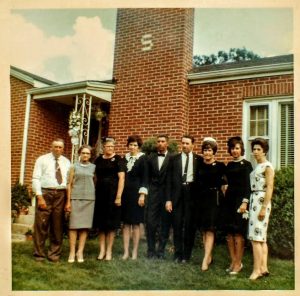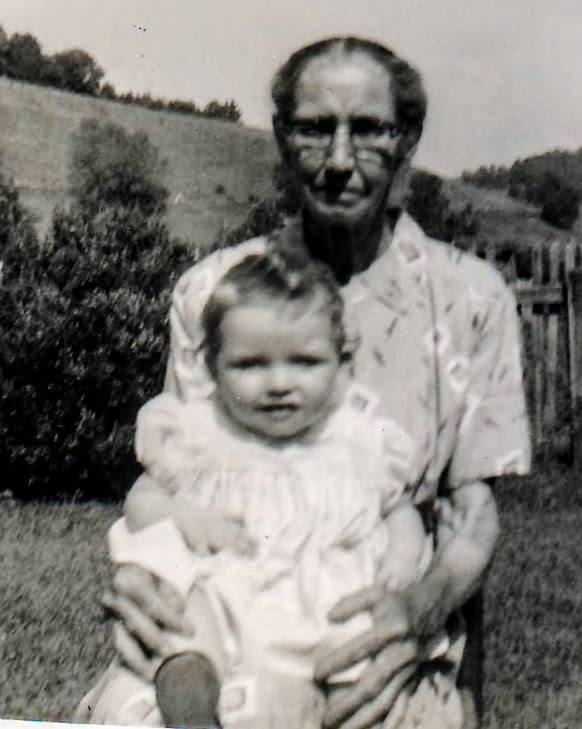Mom slipped into our room about 1:00 one morning when I was 7 and Libby was 4. We were both sound asleep, but as she gently shook us, we gradually woke. Libby wasn’t old enough to question why Mom woke us up, but I was. I was old enough to realize something unusual had to be happening.
“Come on, girls. We need to go down to Maw and Paw’s” was all Mom told us. I wanted to ask why, but sleep staunchly refused to leave me, and in that state of unawareness, I didn’t say anything. I put my coat on while Mom helped Libby get into hers. Daddy picked Libby up; she was sound asleep again as soon as her cheek hit his shoulder. Mom put her arm around me and tenderly guided me out to the car. The doors slammed, and the Volkswagon Bug bounced down the driveway and onto the road. We rode the half mile down the hill to Maw and Paw’s house.
 Again, Daddy carried a still sleeping Libby, and Mom took my hand as we all walked toward the kitchen door. The lights were on much too early on that morning. We stepped into the house and went straight away into the living room where Paw sat in his chair and Maw paced back and forth. She used a tissue to wipe a tear from her cheek.
Again, Daddy carried a still sleeping Libby, and Mom took my hand as we all walked toward the kitchen door. The lights were on much too early on that morning. We stepped into the house and went straight away into the living room where Paw sat in his chair and Maw paced back and forth. She used a tissue to wipe a tear from her cheek.
Daddy went straight to Paw and asked, “How is she?”
“‘Bout the same” he replied.
Daddy walked back to Grandma Eller’s room. Mom had convinced Maw to sit down with her, and Libby was sound asleep in one of the big armchairs. I sat on the couch next to Mom. Even at my young age and as sleepy as I was, I could feel the upset in the room, and this kept me awake.
Daddy came back out, a look of worry and resignation on his face. He sat down, and for the next couple of hours, the adults talked back and forth. Paw occasionally got up and went into Grandma’s room. Mom still sat with Maw, and Libby still slept. I lay down on the couch and dozed but awoke every time someone got up.
Just as I was about to give in to sleep for good, Paw went into Grandma’s room but failed to come right back out. The minutes ticked away, and the tension in the room built. Maw’s tears started again. Daddy’s face looked careworn. I knew what was happening, but I was too young to really process it.
Finally, Paw appeared. Never one to sugar coat anything, he looked straight at all of us and announced, “She’s gone.” Great-Grandma Eller had died in the same bed that she gave life to her children. Maw broke down at this news, and Mom did her best to comfort her. Paw took it in stride as he did all things and showed no emotion. Daddy sat with his head in his hands.
The next week at Maw and Paw’s house was unlike anything I had ever experienced. For that matter, I haven’t experienced anything like it since. By mid-morning, the people from the funeral home came to take Grandma Eller’s body away in their hearse. They put a white wreath on the front door and signs in the road above and below the house that said, “SLOW. FUNERAL.” Neighbors started bringing in food and didn’t stop for the next several days. Family from “up north” arrived throughout the week.
The same hearse that had taken Grandma away brought her back. This time she lay in a casket that they set under the window in the large guest bedroom. I didn’t even realize she was in there until they lifted up the top half, revealing her body from the waist up. For all the world, she looked like she was sleeping peacefully. Dressed in a lovely pink chiffon dress, she had makeup on, and her soft gray hair framed her face perfectly. I thought she was beautiful.
 Fascinated by it all, I spent a lot of time in the guest bedroom with Grandma Eller that week. Libby and I played all around the casket and talked to all the people who signed the book outside the room and then came in to look down at my great-grandmother. Some of them cried softly. Others lingered as if they were waiting for her to wake up. Some of them would look down at us and say things like, “She looks so natural!” or “Didn’t they do a good job?” or “She looks so peaceful.” And sometimes, the guest bedroom where Grandma Eller lay in state became the social center of the community as folks who hadn’t seen each other for a while stood and caught up with one another.
Fascinated by it all, I spent a lot of time in the guest bedroom with Grandma Eller that week. Libby and I played all around the casket and talked to all the people who signed the book outside the room and then came in to look down at my great-grandmother. Some of them cried softly. Others lingered as if they were waiting for her to wake up. Some of them would look down at us and say things like, “She looks so natural!” or “Didn’t they do a good job?” or “She looks so peaceful.” And sometimes, the guest bedroom where Grandma Eller lay in state became the social center of the community as folks who hadn’t seen each other for a while stood and caught up with one another.
I couldn’t quite put together. On the one hand, there were lots of tears and sadness and reminiscing. On the other hand, it was like a big family reunion. The joy of everyone being together pushed grief to the side as brothers and sisters and cousins all sat down to eat from the bounty provided by the community. Conversation was lighter, and laughter would erupt from time to time. It was no wonder Libby and I didn’t quite understand it all
I don’t remember anything about the funeral, so I’m pretty sure the adults decided that Libby and I were too young to be exposed to that level of death. The last thing I remember about Grandma Eller’s death was the tears in Daddy’s eyes as he along with the other pall bearers carried the casket out of the house and to the hearse. I had never seen my daddy cry. That image would stick with me for a long time, and for the first time, I experienced the profound effect death can have on life..
_____________________
By the time we had the next death in our family, this tradition of making the home the center of everything had also died. That process moved to the funeral home, and the staff took care of everything there. We held the visitation, or “viewing” as it was called, in one of the parlor rooms there, and the funeral took place in the chapel attached to the funeral home. Maybe in some ways, this made dealing with death a little easier; maybe not. I do believe it took away some of the personal contact and togetherness that was inherent in the home.
These days, more and more families are choosing something of a hybrid funeral process. I don’t know of anyone who keeps the deceased in the home any longer, but instead of having the visitation and funeral in an impersonal chapel at the funeral home, more and more families are opting to have these events in their home church in surroundings and with people they know and love.

